Critically Discuss the Circumstances of Trust Variation: Law Report
VerifiedAdded on 2023/01/12
|8
|2106
|53
Report
AI Summary
This report delves into the intricacies of English trust law, examining the powers of beneficiaries and courts to vary trust agreements. It begins by defining the role of a beneficiary, their relationship with the trust, and the trustee's fiduciary duties. The report then explores circumstances under which courts and beneficiaries can void or modify trust agreements, including fraud, unclear terms, and the absence of beneficiaries. The report cites relevant case law, such as Comiskey vs. Bowring-Hanbury and Sprange vs. Barnard, to illustrate these points. Ultimately, the report concludes that a strong understanding of these principles is crucial for the effective management and protection of trust assets, ensuring that the rights of beneficiaries are upheld, and the intentions of the settlor are met.
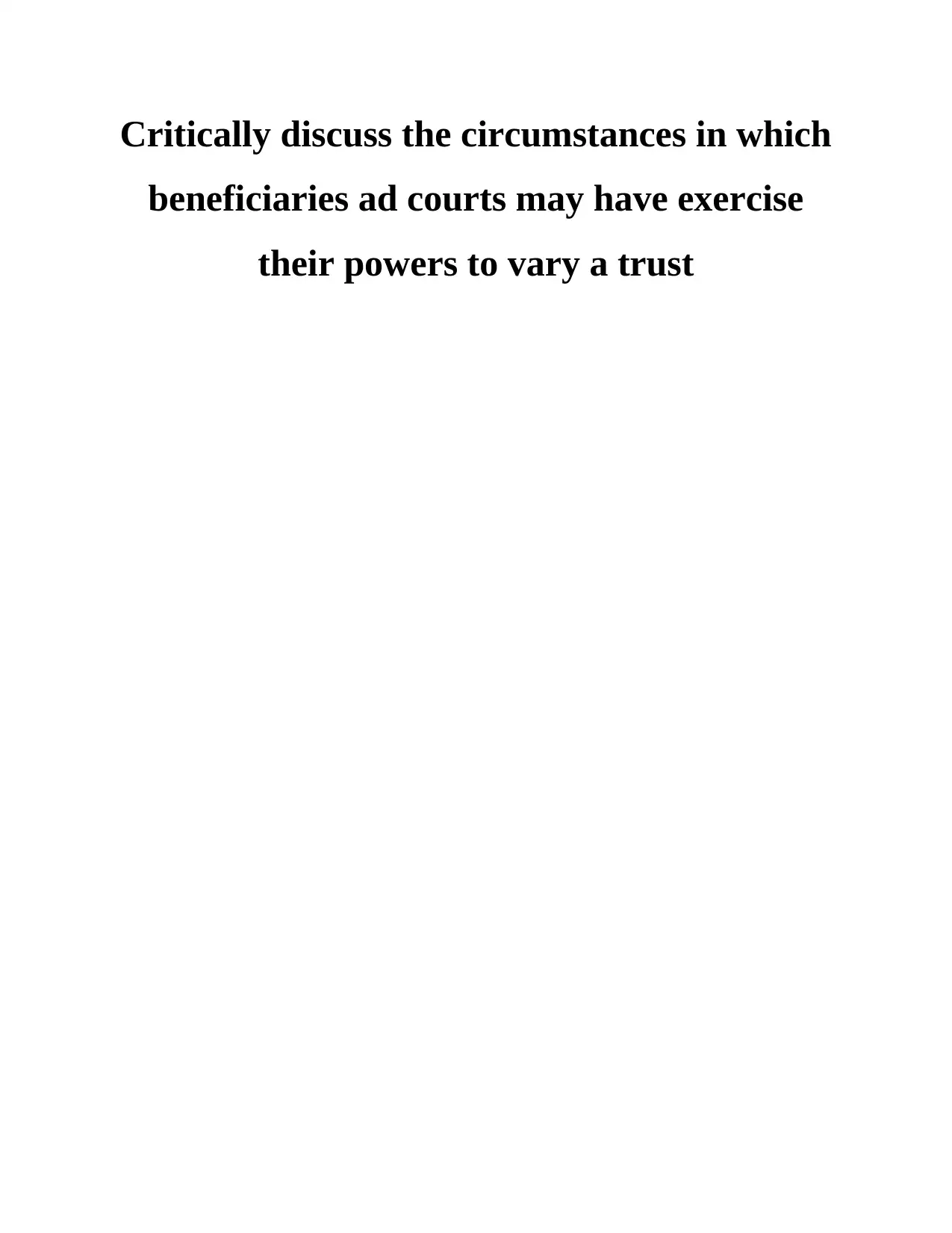
Critically discuss the circumstances in which
beneficiaries ad courts may have exercise
their powers to vary a trust
beneficiaries ad courts may have exercise
their powers to vary a trust
Paraphrase This Document
Need a fresh take? Get an instant paraphrase of this document with our AI Paraphraser
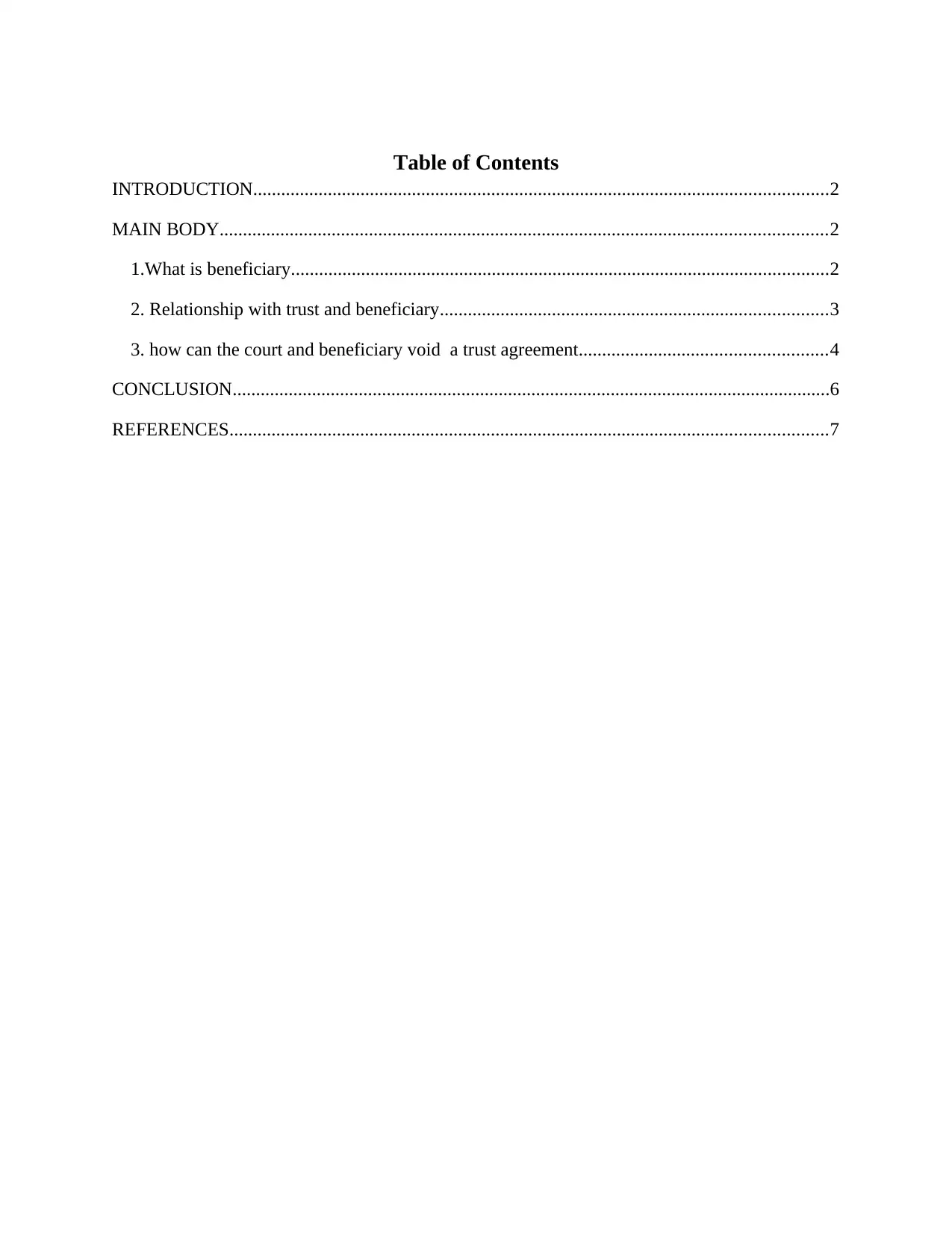
Table of Contents
INTRODUCTION...........................................................................................................................2
MAIN BODY..................................................................................................................................2
1.What is beneficiary...................................................................................................................2
2. Relationship with trust and beneficiary...................................................................................3
3. how can the court and beneficiary void a trust agreement.....................................................4
CONCLUSION................................................................................................................................6
REFERENCES................................................................................................................................7
INTRODUCTION...........................................................................................................................2
MAIN BODY..................................................................................................................................2
1.What is beneficiary...................................................................................................................2
2. Relationship with trust and beneficiary...................................................................................3
3. how can the court and beneficiary void a trust agreement.....................................................4
CONCLUSION................................................................................................................................6
REFERENCES................................................................................................................................7

INTRODUCTION
English trust law is concerned with creation as well as protection of the assets funds that are
held usually by one party for the benefit of other. trust are created by the settler that gives assets
to 1 or more trustees undertaking the use of assets for benefit of the beneficiaries. Breach of trust
occurs when the trustee contravenes terms of trust or duties of trustee. For the breach of trust,
trustees are liable jointly & severally to the beneficiaries where breach has caused loss. Present
report is based over the circumstances where the beneficiaries and courts may exercise their
powers for varying a trust. Report will provide about the beneficiary and its relationship with the
trust. It will also provides about the circumstances where trust agreement could be made void by
court and beneficiary.
MAIN BODY
1.What is beneficiary.
Beneficiary of the trust is individual or the group of people for whom the trust is made.
creator or grantor of trust designates beneficiaries & trustee who have fiduciary duty of
managing the trust assets in best interest of beneficiaries as per the trust agreement. Trust
agreement have three parties settler, trustee and the beneficiary.
One type of the beneficiary is entitled of taking the ownership & control of the trust
capital & income generates which is outlined in trust agreement example. For instance trust
could be established by the parent for child giving beneficiary control over its asset on reaching
maturity age1. This is known as revocable trust where the beneficiaries could be changed during
lifetime.
In irrevocable trusts beneficiaries cannot be changed and also the terms of trust cannot be
amended unless permitted by the beneficiary. Statutory laws govern the right that beneficiary has
to different trust. They have the power of monitoring the trust and trust activities. Beneficiaries
may have accounting of the trust investments. Where it appears to the beneficiary that trustee is
breaching the duty to manage the trust property with diligence, then legal actions could be taken
1 Sitkoff, R.H., 2018. Fiduciary Principles in Trust Law.
English trust law is concerned with creation as well as protection of the assets funds that are
held usually by one party for the benefit of other. trust are created by the settler that gives assets
to 1 or more trustees undertaking the use of assets for benefit of the beneficiaries. Breach of trust
occurs when the trustee contravenes terms of trust or duties of trustee. For the breach of trust,
trustees are liable jointly & severally to the beneficiaries where breach has caused loss. Present
report is based over the circumstances where the beneficiaries and courts may exercise their
powers for varying a trust. Report will provide about the beneficiary and its relationship with the
trust. It will also provides about the circumstances where trust agreement could be made void by
court and beneficiary.
MAIN BODY
1.What is beneficiary.
Beneficiary of the trust is individual or the group of people for whom the trust is made.
creator or grantor of trust designates beneficiaries & trustee who have fiduciary duty of
managing the trust assets in best interest of beneficiaries as per the trust agreement. Trust
agreement have three parties settler, trustee and the beneficiary.
One type of the beneficiary is entitled of taking the ownership & control of the trust
capital & income generates which is outlined in trust agreement example. For instance trust
could be established by the parent for child giving beneficiary control over its asset on reaching
maturity age1. This is known as revocable trust where the beneficiaries could be changed during
lifetime.
In irrevocable trusts beneficiaries cannot be changed and also the terms of trust cannot be
amended unless permitted by the beneficiary. Statutory laws govern the right that beneficiary has
to different trust. They have the power of monitoring the trust and trust activities. Beneficiaries
may have accounting of the trust investments. Where it appears to the beneficiary that trustee is
breaching the duty to manage the trust property with diligence, then legal actions could be taken
1 Sitkoff, R.H., 2018. Fiduciary Principles in Trust Law.
⊘ This is a preview!⊘
Do you want full access?
Subscribe today to unlock all pages.

Trusted by 1+ million students worldwide
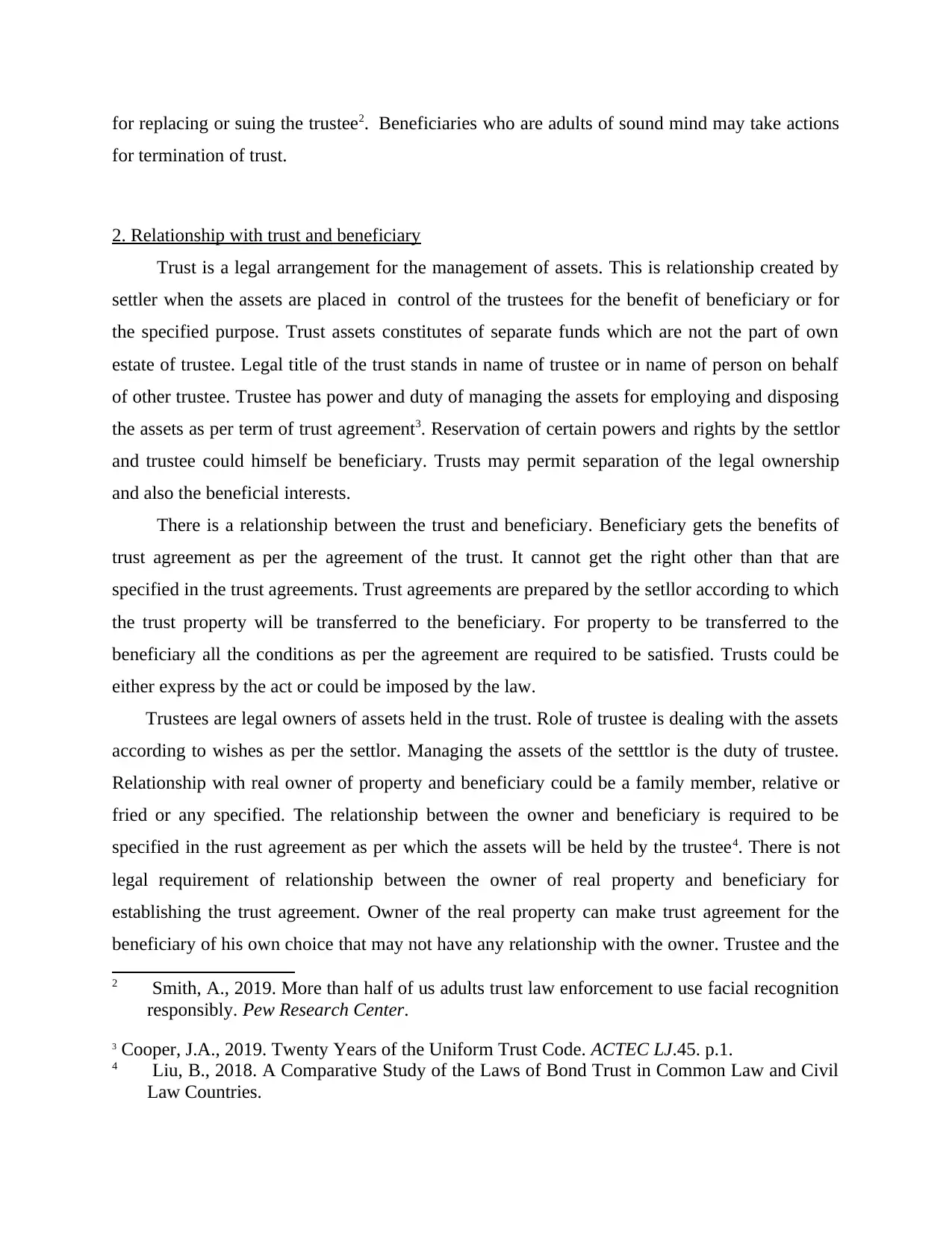
for replacing or suing the trustee2. Beneficiaries who are adults of sound mind may take actions
for termination of trust.
2. Relationship with trust and beneficiary
Trust is a legal arrangement for the management of assets. This is relationship created by
settler when the assets are placed in control of the trustees for the benefit of beneficiary or for
the specified purpose. Trust assets constitutes of separate funds which are not the part of own
estate of trustee. Legal title of the trust stands in name of trustee or in name of person on behalf
of other trustee. Trustee has power and duty of managing the assets for employing and disposing
the assets as per term of trust agreement3. Reservation of certain powers and rights by the settlor
and trustee could himself be beneficiary. Trusts may permit separation of the legal ownership
and also the beneficial interests.
There is a relationship between the trust and beneficiary. Beneficiary gets the benefits of
trust agreement as per the agreement of the trust. It cannot get the right other than that are
specified in the trust agreements. Trust agreements are prepared by the setllor according to which
the trust property will be transferred to the beneficiary. For property to be transferred to the
beneficiary all the conditions as per the agreement are required to be satisfied. Trusts could be
either express by the act or could be imposed by the law.
Trustees are legal owners of assets held in the trust. Role of trustee is dealing with the assets
according to wishes as per the settlor. Managing the assets of the setttlor is the duty of trustee.
Relationship with real owner of property and beneficiary could be a family member, relative or
fried or any specified. The relationship between the owner and beneficiary is required to be
specified in the rust agreement as per which the assets will be held by the trustee4. There is not
legal requirement of relationship between the owner of real property and beneficiary for
establishing the trust agreement. Owner of the real property can make trust agreement for the
beneficiary of his own choice that may not have any relationship with the owner. Trustee and the
2 Smith, A., 2019. More than half of us adults trust law enforcement to use facial recognition
responsibly. Pew Research Center.
3 Cooper, J.A., 2019. Twenty Years of the Uniform Trust Code. ACTEC LJ.45. p.1.
4 Liu, B., 2018. A Comparative Study of the Laws of Bond Trust in Common Law and Civil
Law Countries.
for termination of trust.
2. Relationship with trust and beneficiary
Trust is a legal arrangement for the management of assets. This is relationship created by
settler when the assets are placed in control of the trustees for the benefit of beneficiary or for
the specified purpose. Trust assets constitutes of separate funds which are not the part of own
estate of trustee. Legal title of the trust stands in name of trustee or in name of person on behalf
of other trustee. Trustee has power and duty of managing the assets for employing and disposing
the assets as per term of trust agreement3. Reservation of certain powers and rights by the settlor
and trustee could himself be beneficiary. Trusts may permit separation of the legal ownership
and also the beneficial interests.
There is a relationship between the trust and beneficiary. Beneficiary gets the benefits of
trust agreement as per the agreement of the trust. It cannot get the right other than that are
specified in the trust agreements. Trust agreements are prepared by the setllor according to which
the trust property will be transferred to the beneficiary. For property to be transferred to the
beneficiary all the conditions as per the agreement are required to be satisfied. Trusts could be
either express by the act or could be imposed by the law.
Trustees are legal owners of assets held in the trust. Role of trustee is dealing with the assets
according to wishes as per the settlor. Managing the assets of the setttlor is the duty of trustee.
Relationship with real owner of property and beneficiary could be a family member, relative or
fried or any specified. The relationship between the owner and beneficiary is required to be
specified in the rust agreement as per which the assets will be held by the trustee4. There is not
legal requirement of relationship between the owner of real property and beneficiary for
establishing the trust agreement. Owner of the real property can make trust agreement for the
beneficiary of his own choice that may not have any relationship with the owner. Trustee and the
2 Smith, A., 2019. More than half of us adults trust law enforcement to use facial recognition
responsibly. Pew Research Center.
3 Cooper, J.A., 2019. Twenty Years of the Uniform Trust Code. ACTEC LJ.45. p.1.
4 Liu, B., 2018. A Comparative Study of the Laws of Bond Trust in Common Law and Civil
Law Countries.
Paraphrase This Document
Need a fresh take? Get an instant paraphrase of this document with our AI Paraphraser
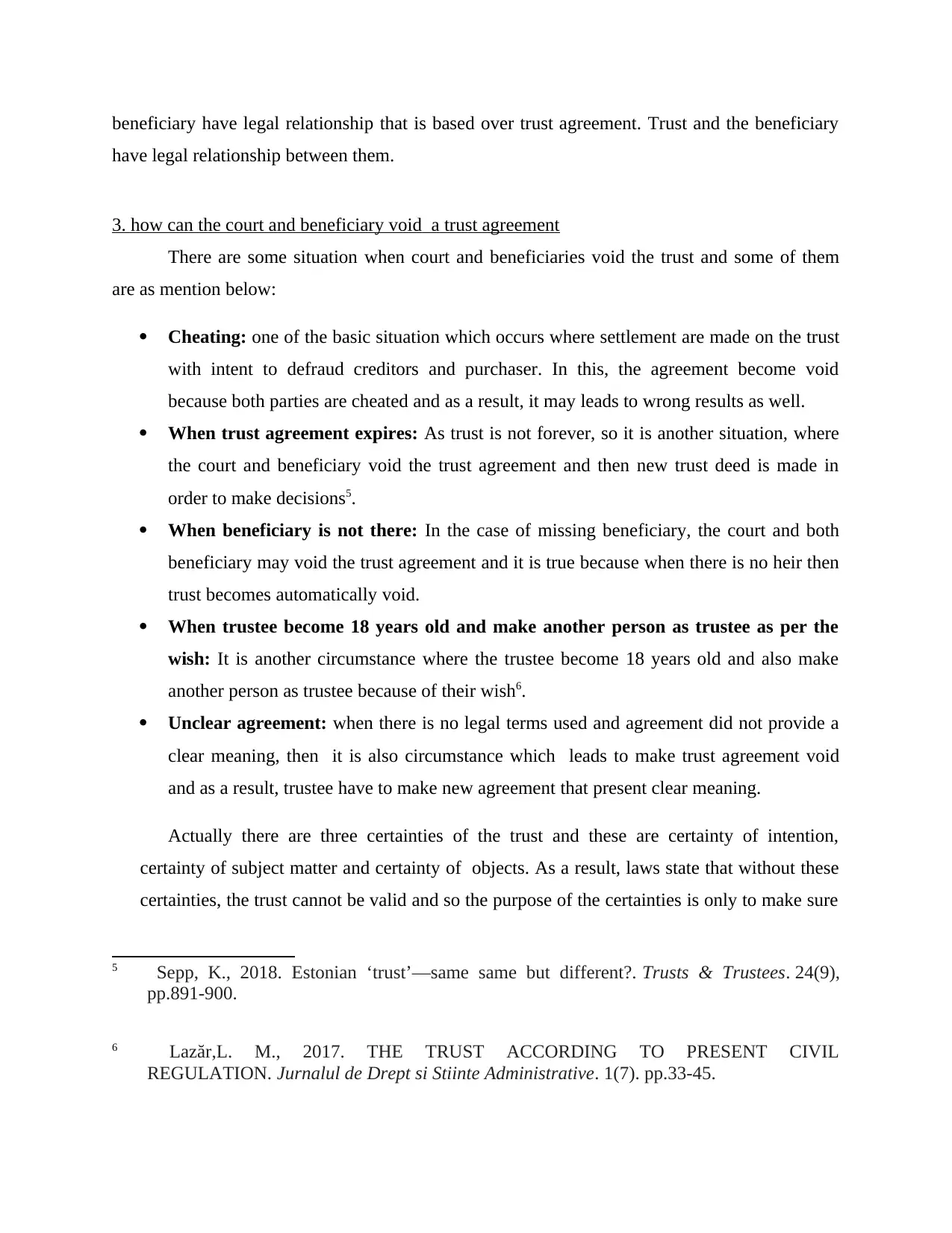
beneficiary have legal relationship that is based over trust agreement. Trust and the beneficiary
have legal relationship between them.
3. how can the court and beneficiary void a trust agreement
There are some situation when court and beneficiaries void the trust and some of them
are as mention below:
Cheating: one of the basic situation which occurs where settlement are made on the trust
with intent to defraud creditors and purchaser. In this, the agreement become void
because both parties are cheated and as a result, it may leads to wrong results as well.
When trust agreement expires: As trust is not forever, so it is another situation, where
the court and beneficiary void the trust agreement and then new trust deed is made in
order to make decisions5.
When beneficiary is not there: In the case of missing beneficiary, the court and both
beneficiary may void the trust agreement and it is true because when there is no heir then
trust becomes automatically void.
When trustee become 18 years old and make another person as trustee as per the
wish: It is another circumstance where the trustee become 18 years old and also make
another person as trustee because of their wish6.
Unclear agreement: when there is no legal terms used and agreement did not provide a
clear meaning, then it is also circumstance which leads to make trust agreement void
and as a result, trustee have to make new agreement that present clear meaning.
Actually there are three certainties of the trust and these are certainty of intention,
certainty of subject matter and certainty of objects. As a result, laws state that without these
certainties, the trust cannot be valid and so the purpose of the certainties is only to make sure
5 Sepp, K., 2018. Estonian ‘trust’—same same but different?. Trusts & Trustees. 24(9),
pp.891-900.
6 Lazăr,L. M., 2017. THE TRUST ACCORDING TO PRESENT CIVIL
REGULATION. Jurnalul de Drept si Stiinte Administrative. 1(7). pp.33-45.
have legal relationship between them.
3. how can the court and beneficiary void a trust agreement
There are some situation when court and beneficiaries void the trust and some of them
are as mention below:
Cheating: one of the basic situation which occurs where settlement are made on the trust
with intent to defraud creditors and purchaser. In this, the agreement become void
because both parties are cheated and as a result, it may leads to wrong results as well.
When trust agreement expires: As trust is not forever, so it is another situation, where
the court and beneficiary void the trust agreement and then new trust deed is made in
order to make decisions5.
When beneficiary is not there: In the case of missing beneficiary, the court and both
beneficiary may void the trust agreement and it is true because when there is no heir then
trust becomes automatically void.
When trustee become 18 years old and make another person as trustee as per the
wish: It is another circumstance where the trustee become 18 years old and also make
another person as trustee because of their wish6.
Unclear agreement: when there is no legal terms used and agreement did not provide a
clear meaning, then it is also circumstance which leads to make trust agreement void
and as a result, trustee have to make new agreement that present clear meaning.
Actually there are three certainties of the trust and these are certainty of intention,
certainty of subject matter and certainty of objects. As a result, laws state that without these
certainties, the trust cannot be valid and so the purpose of the certainties is only to make sure
5 Sepp, K., 2018. Estonian ‘trust’—same same but different?. Trusts & Trustees. 24(9),
pp.891-900.
6 Lazăr,L. M., 2017. THE TRUST ACCORDING TO PRESENT CIVIL
REGULATION. Jurnalul de Drept si Stiinte Administrative. 1(7). pp.33-45.
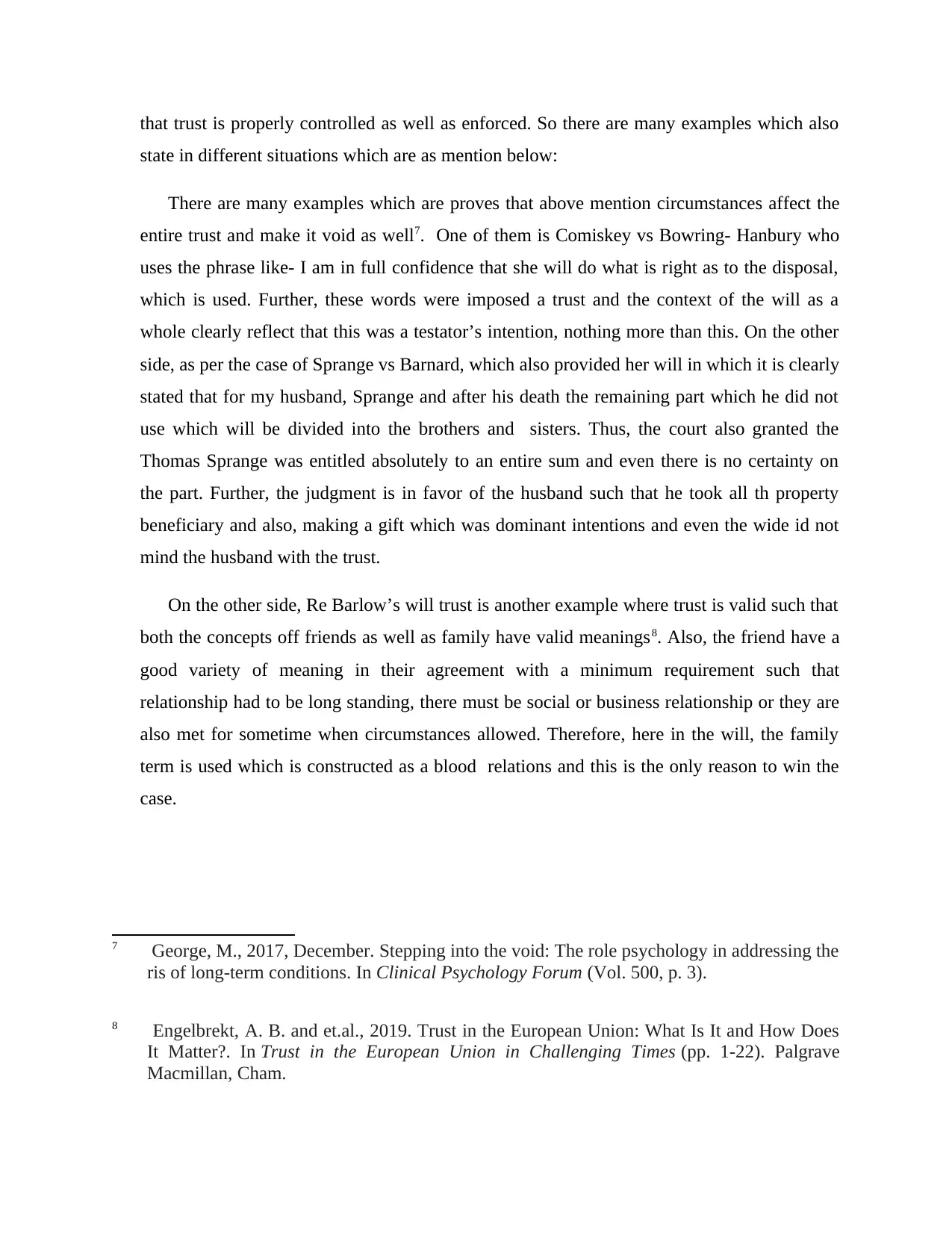
that trust is properly controlled as well as enforced. So there are many examples which also
state in different situations which are as mention below:
There are many examples which are proves that above mention circumstances affect the
entire trust and make it void as well7. One of them is Comiskey vs Bowring- Hanbury who
uses the phrase like- I am in full confidence that she will do what is right as to the disposal,
which is used. Further, these words were imposed a trust and the context of the will as a
whole clearly reflect that this was a testator’s intention, nothing more than this. On the other
side, as per the case of Sprange vs Barnard, which also provided her will in which it is clearly
stated that for my husband, Sprange and after his death the remaining part which he did not
use which will be divided into the brothers and sisters. Thus, the court also granted the
Thomas Sprange was entitled absolutely to an entire sum and even there is no certainty on
the part. Further, the judgment is in favor of the husband such that he took all th property
beneficiary and also, making a gift which was dominant intentions and even the wide id not
mind the husband with the trust.
On the other side, Re Barlow’s will trust is another example where trust is valid such that
both the concepts off friends as well as family have valid meanings8. Also, the friend have a
good variety of meaning in their agreement with a minimum requirement such that
relationship had to be long standing, there must be social or business relationship or they are
also met for sometime when circumstances allowed. Therefore, here in the will, the family
term is used which is constructed as a blood relations and this is the only reason to win the
case.
7 George, M., 2017, December. Stepping into the void: The role psychology in addressing the
ris of long-term conditions. In Clinical Psychology Forum (Vol. 500, p. 3).
8 Engelbrekt, A. B. and et.al., 2019. Trust in the European Union: What Is It and How Does
It Matter?. In Trust in the European Union in Challenging Times (pp. 1-22). Palgrave
Macmillan, Cham.
state in different situations which are as mention below:
There are many examples which are proves that above mention circumstances affect the
entire trust and make it void as well7. One of them is Comiskey vs Bowring- Hanbury who
uses the phrase like- I am in full confidence that she will do what is right as to the disposal,
which is used. Further, these words were imposed a trust and the context of the will as a
whole clearly reflect that this was a testator’s intention, nothing more than this. On the other
side, as per the case of Sprange vs Barnard, which also provided her will in which it is clearly
stated that for my husband, Sprange and after his death the remaining part which he did not
use which will be divided into the brothers and sisters. Thus, the court also granted the
Thomas Sprange was entitled absolutely to an entire sum and even there is no certainty on
the part. Further, the judgment is in favor of the husband such that he took all th property
beneficiary and also, making a gift which was dominant intentions and even the wide id not
mind the husband with the trust.
On the other side, Re Barlow’s will trust is another example where trust is valid such that
both the concepts off friends as well as family have valid meanings8. Also, the friend have a
good variety of meaning in their agreement with a minimum requirement such that
relationship had to be long standing, there must be social or business relationship or they are
also met for sometime when circumstances allowed. Therefore, here in the will, the family
term is used which is constructed as a blood relations and this is the only reason to win the
case.
7 George, M., 2017, December. Stepping into the void: The role psychology in addressing the
ris of long-term conditions. In Clinical Psychology Forum (Vol. 500, p. 3).
8 Engelbrekt, A. B. and et.al., 2019. Trust in the European Union: What Is It and How Does
It Matter?. In Trust in the European Union in Challenging Times (pp. 1-22). Palgrave
Macmillan, Cham.
⊘ This is a preview!⊘
Do you want full access?
Subscribe today to unlock all pages.

Trusted by 1+ million students worldwide
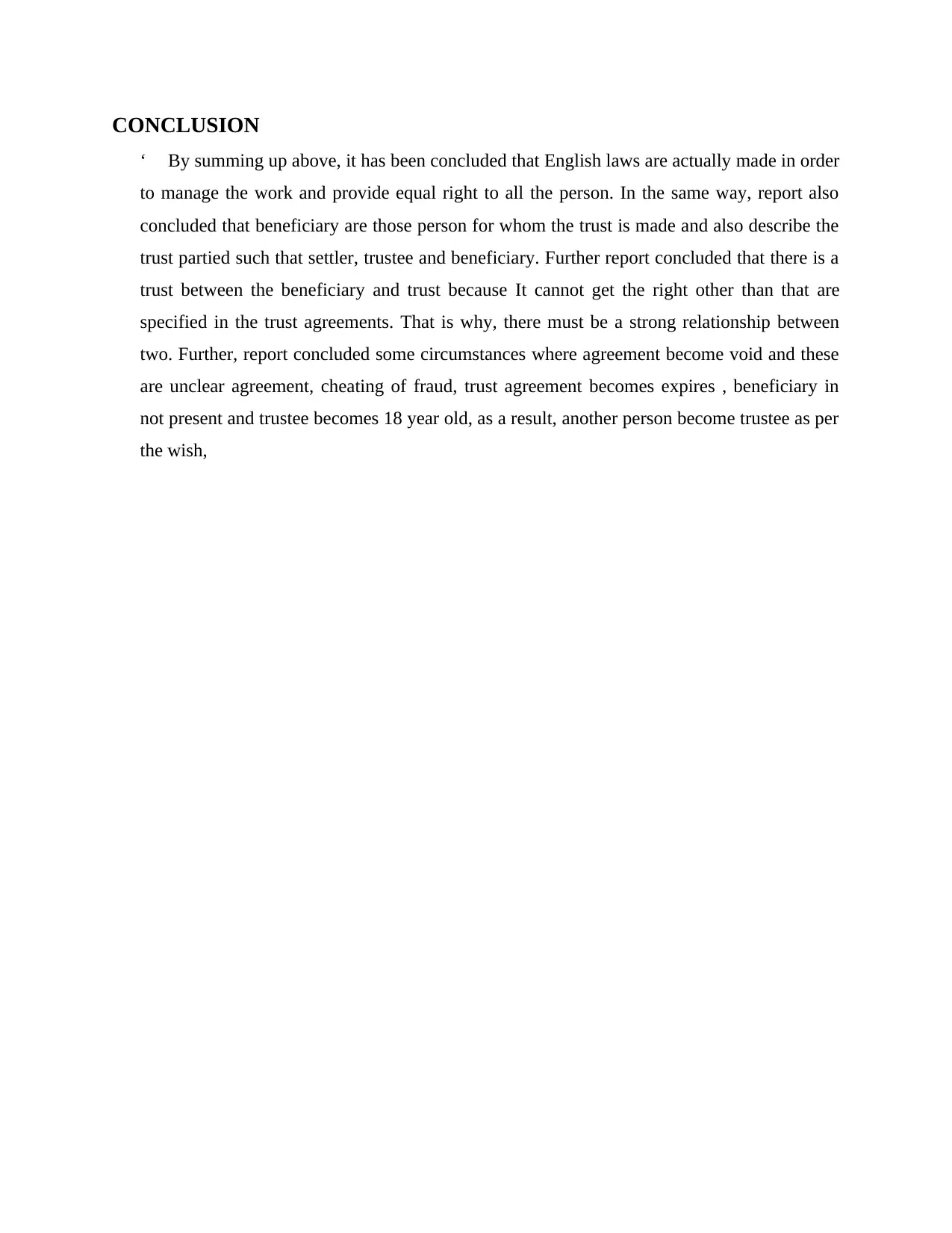
CONCLUSION
‘ By summing up above, it has been concluded that English laws are actually made in order
to manage the work and provide equal right to all the person. In the same way, report also
concluded that beneficiary are those person for whom the trust is made and also describe the
trust partied such that settler, trustee and beneficiary. Further report concluded that there is a
trust between the beneficiary and trust because It cannot get the right other than that are
specified in the trust agreements. That is why, there must be a strong relationship between
two. Further, report concluded some circumstances where agreement become void and these
are unclear agreement, cheating of fraud, trust agreement becomes expires , beneficiary in
not present and trustee becomes 18 year old, as a result, another person become trustee as per
the wish,
‘ By summing up above, it has been concluded that English laws are actually made in order
to manage the work and provide equal right to all the person. In the same way, report also
concluded that beneficiary are those person for whom the trust is made and also describe the
trust partied such that settler, trustee and beneficiary. Further report concluded that there is a
trust between the beneficiary and trust because It cannot get the right other than that are
specified in the trust agreements. That is why, there must be a strong relationship between
two. Further, report concluded some circumstances where agreement become void and these
are unclear agreement, cheating of fraud, trust agreement becomes expires , beneficiary in
not present and trustee becomes 18 year old, as a result, another person become trustee as per
the wish,
Paraphrase This Document
Need a fresh take? Get an instant paraphrase of this document with our AI Paraphraser
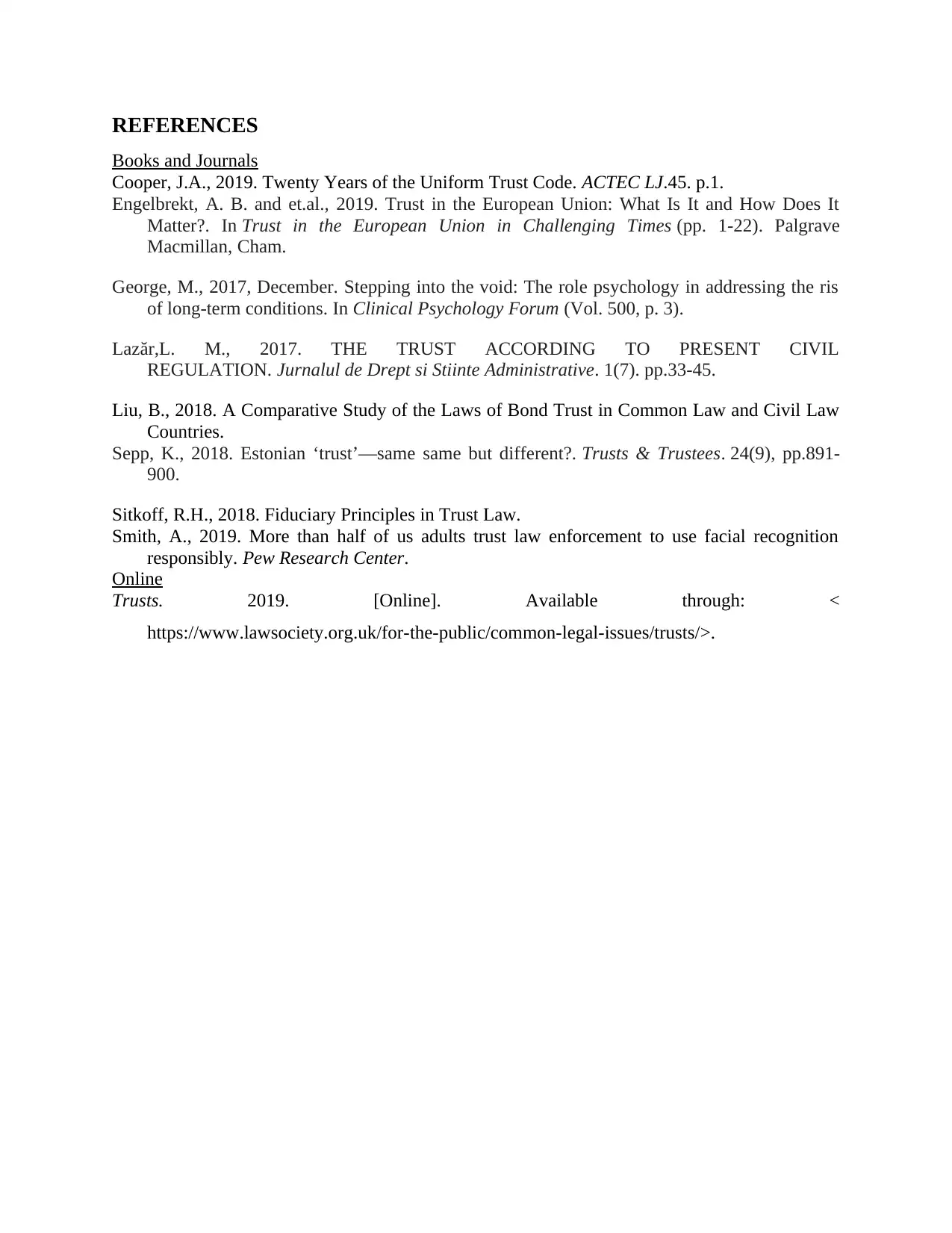
REFERENCES
Books and Journals
Cooper, J.A., 2019. Twenty Years of the Uniform Trust Code. ACTEC LJ.45. p.1.
Engelbrekt, A. B. and et.al., 2019. Trust in the European Union: What Is It and How Does It
Matter?. In Trust in the European Union in Challenging Times (pp. 1-22). Palgrave
Macmillan, Cham.
George, M., 2017, December. Stepping into the void: The role psychology in addressing the ris
of long-term conditions. In Clinical Psychology Forum (Vol. 500, p. 3).
Lazăr,L. M., 2017. THE TRUST ACCORDING TO PRESENT CIVIL
REGULATION. Jurnalul de Drept si Stiinte Administrative. 1(7). pp.33-45.
Liu, B., 2018. A Comparative Study of the Laws of Bond Trust in Common Law and Civil Law
Countries.
Sepp, K., 2018. Estonian ‘trust’—same same but different?. Trusts & Trustees. 24(9), pp.891-
900.
Sitkoff, R.H., 2018. Fiduciary Principles in Trust Law.
Smith, A., 2019. More than half of us adults trust law enforcement to use facial recognition
responsibly. Pew Research Center.
Online
Trusts. 2019. [Online]. Available through: <
https://www.lawsociety.org.uk/for-the-public/common-legal-issues/trusts/>.
Books and Journals
Cooper, J.A., 2019. Twenty Years of the Uniform Trust Code. ACTEC LJ.45. p.1.
Engelbrekt, A. B. and et.al., 2019. Trust in the European Union: What Is It and How Does It
Matter?. In Trust in the European Union in Challenging Times (pp. 1-22). Palgrave
Macmillan, Cham.
George, M., 2017, December. Stepping into the void: The role psychology in addressing the ris
of long-term conditions. In Clinical Psychology Forum (Vol. 500, p. 3).
Lazăr,L. M., 2017. THE TRUST ACCORDING TO PRESENT CIVIL
REGULATION. Jurnalul de Drept si Stiinte Administrative. 1(7). pp.33-45.
Liu, B., 2018. A Comparative Study of the Laws of Bond Trust in Common Law and Civil Law
Countries.
Sepp, K., 2018. Estonian ‘trust’—same same but different?. Trusts & Trustees. 24(9), pp.891-
900.
Sitkoff, R.H., 2018. Fiduciary Principles in Trust Law.
Smith, A., 2019. More than half of us adults trust law enforcement to use facial recognition
responsibly. Pew Research Center.
Online
Trusts. 2019. [Online]. Available through: <
https://www.lawsociety.org.uk/for-the-public/common-legal-issues/trusts/>.
1 out of 8
Related Documents
Your All-in-One AI-Powered Toolkit for Academic Success.
+13062052269
info@desklib.com
Available 24*7 on WhatsApp / Email
![[object Object]](/_next/static/media/star-bottom.7253800d.svg)
Unlock your academic potential
Copyright © 2020–2026 A2Z Services. All Rights Reserved. Developed and managed by ZUCOL.





